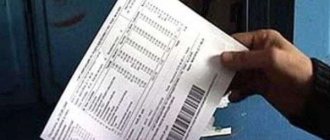What are the consequences of non-payment of housing and communal services?
For non-payment or late payment of utilities, penalties will be charged.
Photo: Andrey TSYGANOV
Unpaid receipts are increasingly becoming one of the most pressing problems. We don’t seem to consume that much, but our bills are growing. What happens if you don't pay?
RECEIVE A SALARY - RECEIVE RENT...
Owners are required to pay fees for housing and utilities. This is stated in Article 153 of the Housing Code of the Russian Federation. Moreover, this “must” arises immediately after registration of ownership of the residential premises. Whether you live there or not, no one cares.
There is a similar obligation for those who occupy housing under a social tenancy agreement - that is, live in a non-privatized apartment.
And if you are in debt for several months, then be so kind as to fork out. Otherwise, the case will take a sharper turn until the court...
So, the main ways to deal with debtors are charging penalties, limiting supplies and disconnecting from the network, suspending gas supplies, eviction and litigation.
THE DEBT IS ACCURING, THE INTEREST IS GROWING
For non-payment or late payment of utility services, penalties are charged. In modern management companies and homeowners associations, late fees are calculated automatically using software. And the very next day after the delay, in accordance with clause 14 of Article 155 of the RF Housing Code. From the second month, the following interest will accrue on the debt amount:
— 31-90 days - 1/300 of Central Bank refinancing per day.
- more than 90 days - 1/130 of the Central Bank refinancing rate per day.
From January 1, 2020, the refinancing rate became equal to the key rate, which means that penalties for late taxes and contributions increased.
For example, if you owe 5,000 thousand rubles for housing and communal services this year, 2020, then in the first 3 months you will accrue about 500 rubles. penalties, while two years earlier it would have been about 350 rubles. If you owe 50 thousand rubles in a year, then the numbers will be unrealistic!!!
How to calculate: 15,000 (amount for 3 months) X 90 (number of overdue days)/300 = 495 rubles.
ON A NOTE
If you pay a receipt through a terminal, you won’t be able to pay the penalty, and the debt will only grow. They can only be paid at a Sberbank branch or at the management company.
FIRE, WATER AND COPPER PIPES
If the owner has a debt on the apartment for more than 3 months, then he faces a temporary restriction of services or disconnection in accordance with the legally established procedure until the debt is repaid. Or a month after a written warning.
“The restriction and termination of the provision of utility services occurs in accordance with the Rules for the provision of utility services to owners and users of premises in apartment buildings and residential buildings, approved by Decree of the Government of the Russian Federation of May 6, 2011 No. 354,” states Svetlana Zhmurko, lawyer of the Moscow Interregional Bar Association.
After repayment of the debt, water and electricity must be turned on within two days.
WE ARE GASING
You need to press the pedals after two warnings - one for 40 days, the other for 20. And run to pay the bills. Otherwise, life will not be the same without gas. This issue is regulated by government decree No. 549 dated July 21, 2008 “On the procedure for supplying gas to meet the household needs of citizens.”
THE COURT IS COMING
Debt collection can be carried out in court. In this case, the cost of the claim may increase taking into account legal costs. A management company, homeowners association or developer has the right, independently or with the involvement of a third party, to work to collect debts for utility bills from consumers.
— The service provider has the right to go to court with a demand to collect arrears in payment of utility services from the consumer, if the contract for the provision of utility services has been concluded directly with him. Debts for payment of residential premises, utilities, as well as telephone services, if their amount does not exceed 500 thousand rubles, are collected in a simplified manner, by issuing a court order, which is also a writ of execution, informs Svetlana Zhmurko.
Since June 2020, the procedure for collecting debt for housing and communal services has been simplified. When submitting documents, the court makes a positive decision within 5 days without a public hearing. The debtor is given 10 days to cancel the court order - to do this, it is enough to write a statement indicating that the calculation is incorrect or the claims are unfounded. In this case, the decision will be reversed and the utility will need to re-file the claim. After this, the case will be considered in a general manner with both parties summoned.
If this does not happen, then after receiving a court order, the utility organization can contact the bailiff service. Most often, collection is made from the debtor's income. This could be a salary, a pension.
ON A NOTE
In a month, the amount of deductions cannot exceed half of the total monthly income.
TO THE EXIT!
If the apartment is not privatized, they can even be evicted from it for non-payment. Yes, yes, you heard right! Because Article 40 of the Constitution of the Russian Federation guarantees citizens the right to housing, and the Code of Civil Procedure states that penalties do not apply to residential premises if they are considered the only ones suitable for habitation. But the size of the apartment is not specified.
-Thus, if the tenant and his family members living with him for more than six months do not pay for housing and utilities without good reason, they can be evicted in court with the provision of another residential premises under a social tenancy agreement, the amount of which corresponds the size of the living space established for moving citizens into the hostel. But forced eviction is not allowed if the reasons for arrears in rent are valid, for example, long-term non-payment of wages, says Svetlana Zhmurko.
ON A NOTE
Citizens live in a hostel under a tenancy agreement for a certain period (work, study, service). The rights and obligations of the tenant under such an agreement coincide with the social tenancy agreement. Therefore, the landlord has every reason to evict a person for debts of more than six months without providing other housing.
IN WHAT CASES IS THE LAW ON YOUR SIDE?
Lawyer Svetlana Zhmurko answers.
1. If, when checking the metering devices, it turns out that the meter is in good condition, but its readings differ from those that the consumer submitted to calculate the cost of the utility service for the billing period preceding the check (an overpayment occurred).
In this case, the service fee is recalculated based on the meter readings taken by the inspectors.
2. If a consumer living in a residential premises that is not equipped with an individual or common (apartment) metering device due to the lack of technical ability to install it, is temporarily absent for a period of more than five full calendar days in a row.
Recalculation (for these five days when services were not provided) is made at the request of the consumer. To recalculate, you should contact the management organization, homeowners association or housing cooperative with an application for recalculation of the amount of payment for utilities, indicating the period of temporary absence.
It is important that the application must be submitted before the start of the period of temporary absence or no later than 30 days after its end.
The person providing utility services recalculates the payment for them based on the number of complete calendar days of the consumer’s absence. The day of departure and the day of return home are not taken into account.
However, on this basis, the amount of payment for heating, electricity and gas supply for heating residential premises, as well as for utilities for general house needs, is not recalculated. In addition, the fee for the sewerage service (this is sewerage) will be recalculated only if the fee for the utility service for cold or hot water supply is recalculated.
3. When providing utility services with interruptions exceeding the established duration, the amount of payment for utility services is reduced. In this case, the person guilty of violating the continuity of provision and (or) quality of utility services is obliged to pay the consumer a fine in accordance with Part 4 of Article 157 of the Housing Code of the Russian Federation.
IMPORTANT
Debt cannot be collected from minors and persons declared incompetent, since the obligation to pay housing and communal services payments for them must be fulfilled by legal representatives and guardians.
Information on the receipt
Monthly receipts are sent to the owner with the specified amount, which must be paid by the 10th of the month. Upon receipt of the payment, meter readings are immediately entered.
The receipt contains the following information:
| Address, full name of the owner | number of registered people |
| Services list | cost of 1 unit of service |
| Amount of resources consumed | standards |
| Amount to be paid for each service separately | and total amount |
| Information | for the payer - telephone numbers, addresses, etc. |
The receipt also indicates available benefits and subsidies. If payment for the previous month was paid incompletely or late, then penalties will be charged.
They are indicated on the receipt in a special line. If an overpayment was made last month, the amount will also be reflected in the payment slip.
The amount payable is calculated taking into account the specified overpayment.
Trial
Well, if it comes to court, the process will most likely end in hassle and loss of time for both parties. However, it is worth keeping in mind that at this stage everything can be resolved peacefully. As a rule, judges invite the parties to enter into a guarantee agreement, according to which the debtor is obliged to repay his existing debt. In this case, the supply of, for example, electricity will not be interrupted.
For example, AAREC-Energosbyt LLP resorts to extreme measures if the debtor consumer does not respond to calls to pay for consumed electricity. For those subscribers who are faced with financial difficulties, AEDC-Energosbyt LLP meets halfway by drawing up a payment schedule in installments.
But if any of the parties does not agree, then the case will be considered on its merits. The duration of the proceedings depends on the complexity of the case itself. Perhaps the issue will be resolved within one or two hearings. But it is possible that the legal proceedings will drag on for several months.
Debt for housing and communal services: fines and other possible consequences
Debtors who have privatized living space also often ask whether they can take away the apartment for debts. Housing and communal services do not have the right to take away real estate that is owned by a person and is the only housing suitable for living. According to the law, it is possible to take away a privatized apartment only if the tenant has other real estate properties and the amount of debt is comparable to the cost of the apartment.
We recommend reading: List of Diseases for Determining Disability Pp 339
What to do with a large utility debt
- Contact the housing office at your place of registration or the management company. You will be informed of the amount and penalties assessed, if any. But you should be prepared for the fact that in order to obtain the necessary information, the likelihood of standing in a long line is high, which means that a lot of time will be spent.
- Go to the website of your management company, register (for this you will need a phone number), log into your personal account, enter your personal account number.
- Use the services of a bank that provides services for paying for housing and communal services: register, log into your personal account. This way you can not only find out the amount of debt, but also pay it immediately if necessary.
We recommend reading: Where to apply for additional leave for those who voluntarily left the resettlement zone
Administrative responsibility
Also, the legislation of the Republic of Kazakhstan provides for administrative liability, regulated by Article 524 of the Code of the Republic of Kazakhstan “On Administrative Violations”, in the form of imposing a fine on individuals in the amount of up to 10, and on officials in the amount of up to 20 monthly calculation indices. Administrative arrest for up to 10 days and criminal liability for malicious failure to comply with a judicial act (court decision) that has entered into legal force, provided for in Article 362 of the Criminal Code of the Republic of Kazakhstan, are also possible.









